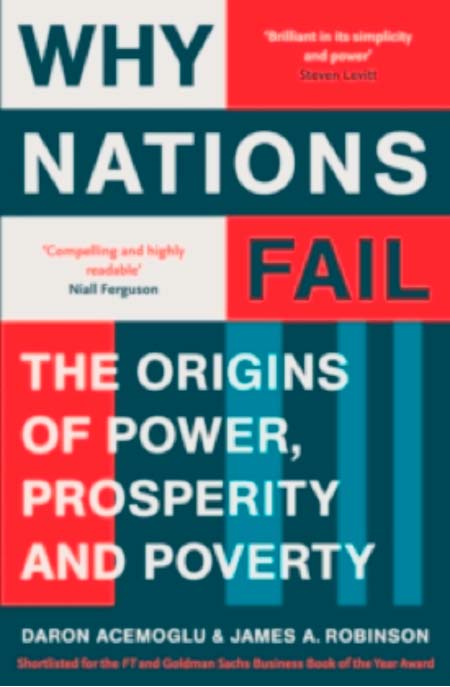
Two
US academics offer a compelling analysis of the world’s financial malaise
As
the turbulence of global economic crisis starts to recede, the two fundamental
features of the world economy in our times re-emerge. One is the gap between
rich and poor countries. Two hundred years ago, there was no such gap, at least
not on the scale we are used to today; nor, most probably, will there be one in
200 years’ time. But the present reality is of astounding difference: the same
people can live in abject poverty in one country, yet be prosperous once they
move to another.
This
book takes the graphic example of the twin towns of Nogales, one on the Mexican
side of the border, the other on the American side: why does a border make such
a difference? Self-evidently, this question matters, because unacceptable
global inequality generates other brute facts: the psychologies of guilt and
resentment; escalating pressures for migration; and the nightmare choices that
face the world when some nations do not merely fall behind, but fall apart.
Scholars
have struggled for decades to find a convincing answer. Often, the direction of
search has been technocratic. In the 1960s, the dominant explanation was that
poor countries lacked capital; by the 1980s, it was that they had poor economic
policies.
The
last decade has appeared to offer a new and potent clue: the ascent of China,
which is the other fundamental feature of our times. China’s growth is an
economic phenomenon without precedent that has implications both for poverty
and geopolitics. It has lifted millions out of penury and the country is
projected soon to topple America from its position as the world’s largest
economy. The beacon offered by China has been widely interpreted, especially by
African elites, as demonstrating the benefits of autocracy.
For
anyone remotely interested in these issues Why Nations Fail is a must-read.
Acemoglu and Robinson are intellectual heavyweights of the first rank, the one
a professor of economics at MIT, the other a professor of political science at
Harvard. Mostly, such people write only for other academics. In this book, they
have done you the courtesy of writing a book that while at the intellectual
cutting edge is not just readable but engrossing. This alone would be reason to
take notice: a vital topic, top scholars, and a well-written book.
But
this is not the half of it. The reason that Why Nations Fail is not to be
missed is that their thesis pulls apart the two big brute facts of global
development. Far from seeing China as the clue to spreading prosperity,
Acemoglu and Robinson see it as yet another instance of a society rushing into
a cul-de-sac. China is not, on their analysis, on course for our own level of
prosperity.
Their
argument is that the modern level of prosperity rests upon political
foundations. Proximately, prosperity is generated by investment and innovation,
but these are acts of faith: investors and innovators must have credible
reasons to think that, if successful, they will not be plundered by the powerful.
For
the polity to provide such reassurance, two conditions have to hold: power has
to be centralised and the institutions of power have to be inclusive. Without
centralised power, there is disorder, which is anathema to investment.
China
most certainly ticks this box – it has centralised power and order in spades.
Some African societies don’t; localised power usurps the authority of the
state. But China resoundingly fails to tick the box of inclusive institutions.
Acemoglu and Robinson quote a summary of the structure of Chinese political
power: “The party controls the armed forces; the party controls cadres; and the
party controls the news.”
That
states need order to prosper is important but no longer controversial. That
they need inclusive institutions is, in view of China’s success, wildly
controversial. Their argument is that order without inclusive institutions may
enable an economy to escape poverty, but will not permit the full ascent to
modern prosperity. Their explanation is that if the institutions of power
enable the elite to serve its own interest – a structure they term “extractive
institutions” – the interests of the elite come to collide with, and prevail
over, those of the mass of the population.
So,
if inclusive institutions are necessary, how do they come about? Again,
Acemoglu and Robinson are radical. They argue that there is no natural process
whereby rising prosperity in an autocracy evolves into inclusion. Rather, it is
only in the interest of the elite to cede power to inclusive institutions if
confronted by something even worse, namely the prospect of revolution. The
foundations of prosperity are political struggle against privilege.
A
thesis can be summarised, albeit crudely, in a short review. Yet the main
strength of this book is beyond the power of summary: it is packed, from
beginning to end, with historical vignettes that are both erudite and
fascinating. As Jared Diamond says on the cover: “It will make you a
spellbinder at parties.” But it will also make you think.
Read Other Articles In Article (Archive)
Gambian Starlet Earns Pompey Deal
Jul 29, 2008, 12:17 PM

Access and Central Bank share spoils in inter-bank tourney opener
Feb 5, 2020, 1:48 PM



